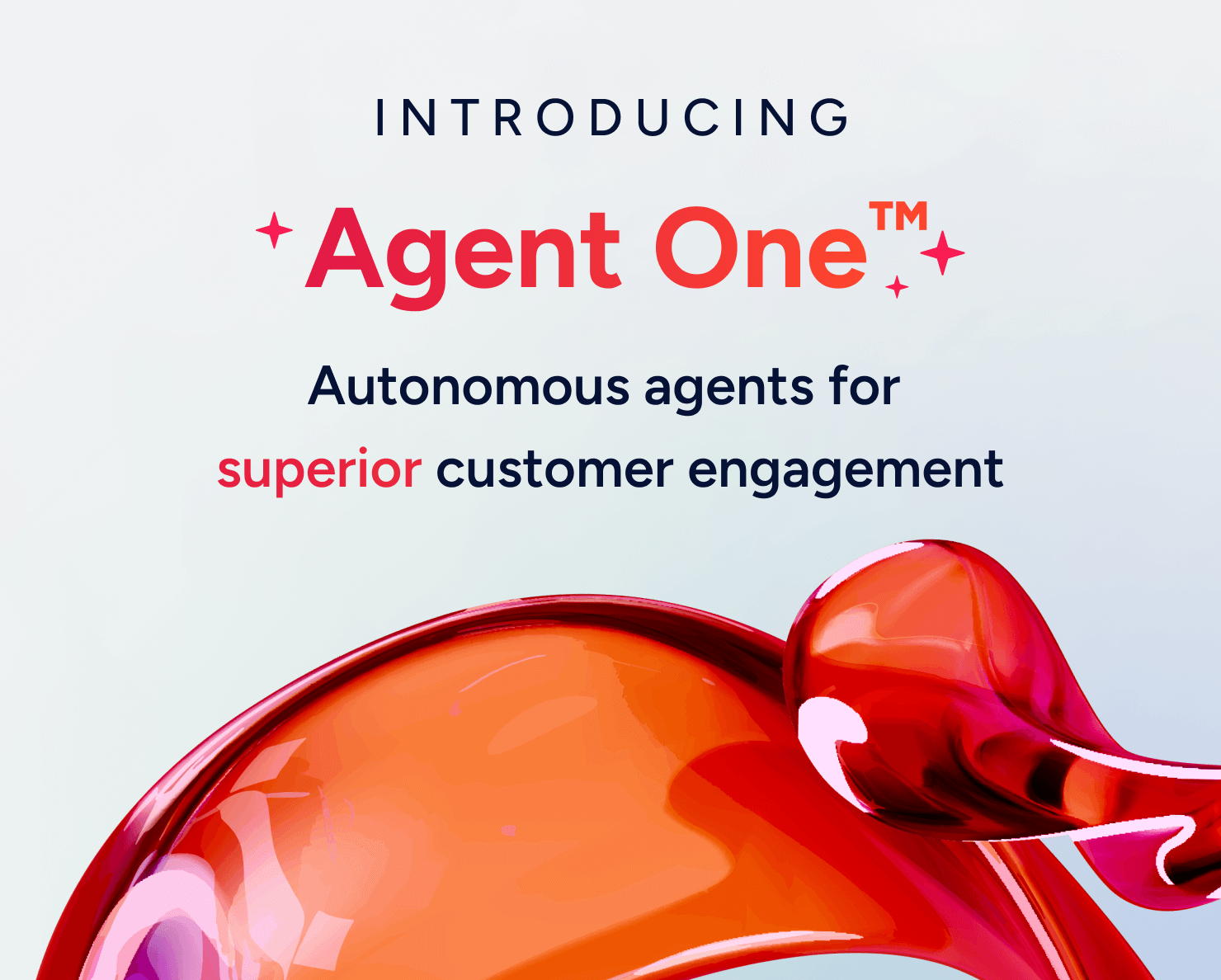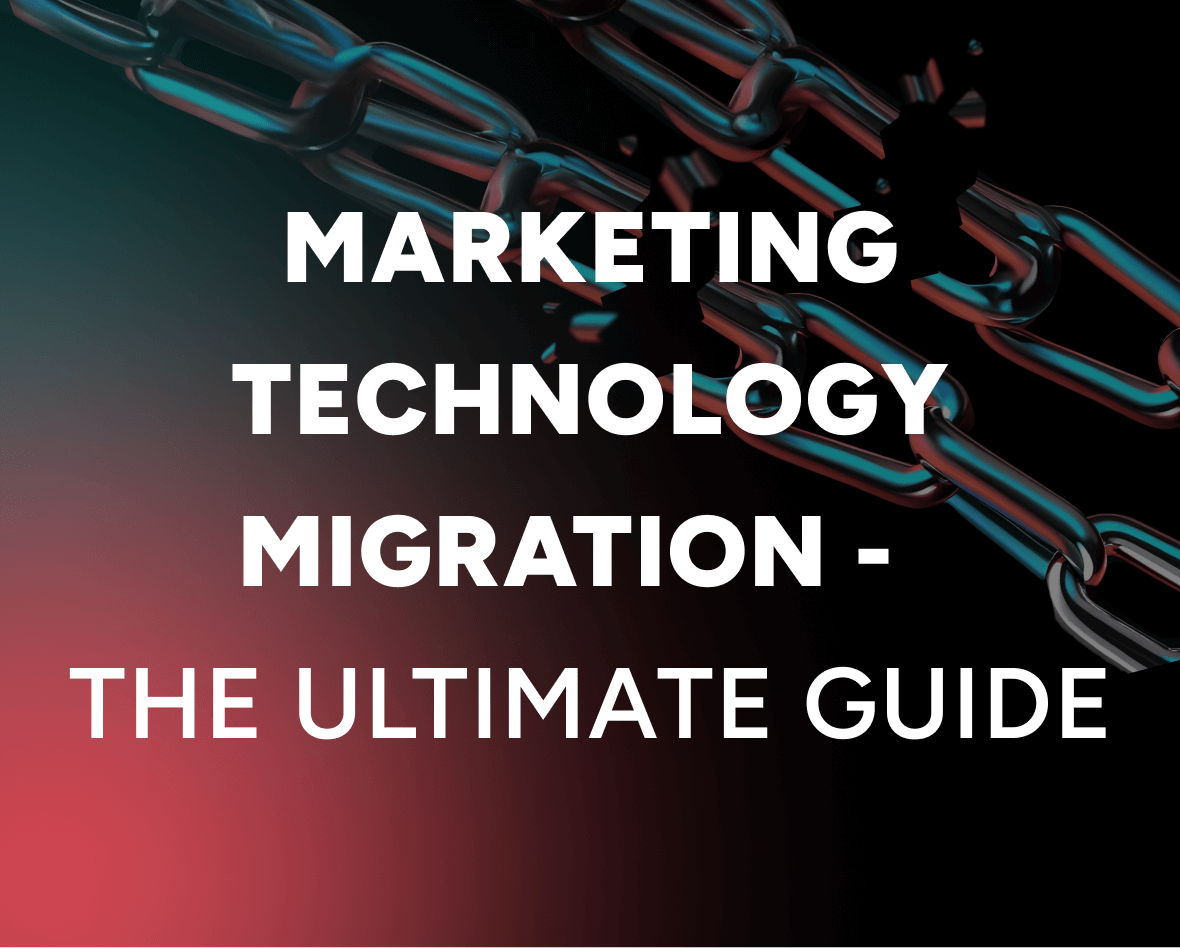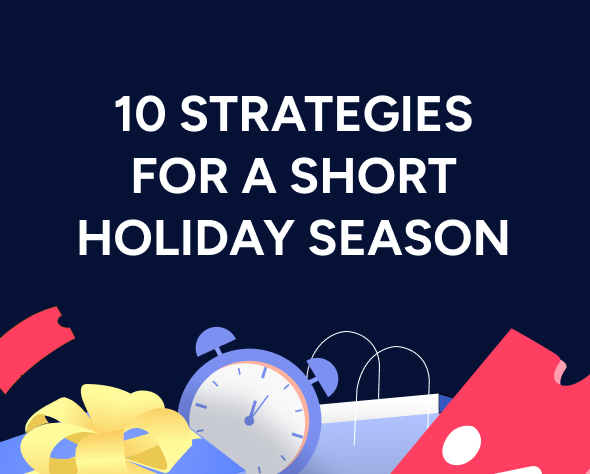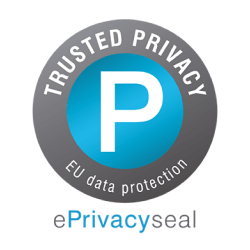eCommerce site search: Best practices, tools, and features
The process of searching for products is so natural that we often take for granted how essential it is to the entire shopping experience.
Updated on 26 Dec 2024
At the same time, customers are still faced with a plethora of site search issues like:
- Being shown products that aren’t relevant to their query or their behaviors and preferences.
- Having to phrase their query in a bunch of different ways when they don’t know the exact product name.
- Getting irrelevant or no results when they use different language (like synonyms, slangs, and abbreviations) than the one used in the store’s catalog.
When these issues occur, most shoppers don’t continue browsing the site in hopes of finding what they need. They bounce, which forces brands to either retarget them with expensive ads or lose out on potential customers.
In this guide, you’ll learn everything you need to know about eCommerce site search, including how to avoid these common pitfalls. We’ll explore the benefits and importance of a good search experience, key features and best practices when it comes to choosing an eCommerce site search solution, and more.
What is eCommerce site search?
The term eCommerce site search refers to the technological solutions that deliver relevant results to people using your website search function.
These solutions (sometimes called site search engines, eCommerce search engines, or search-as-a-service) let shoppers search through your product catalog and help them find what they’re looking for as fast as possible.
They do this by combining various artificial intelligence (AI) and machine learning techniques like natural language processing (NLP) to extract the exact intent behind each query.
The benefits and importance of good eCommerce site search
A good eCommerce site search experience matters for one simple reason — users expect it and will leave your site if they don’t get it. People use a website’s search functionality in around 20% of all sessions, with a 12% exit rate after an unsatisfactory result.
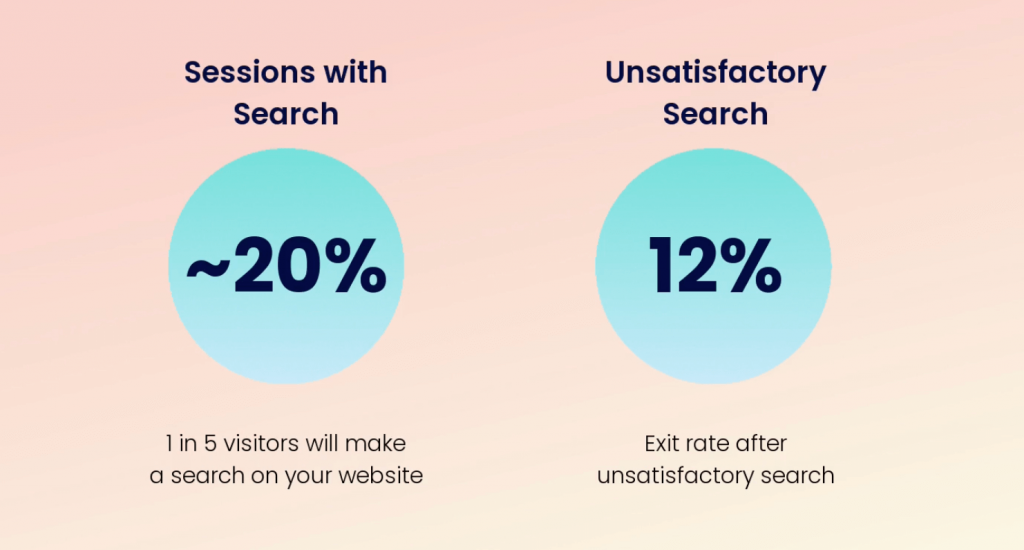
Put simply, if your search experience isn’t optimized, you’re losing potential customers. At the same time, when someone uses your site search bar, you get a chance to make a sale by delivering a smooth, useful, and personalized user experience.
The benefits of a good site search experience include:
- Lower bounce rates. When searchers find exactly what they need, they’re much less likely to bounce from your site without at least browsing and adding items to their carts.
- Higher conversion rates and average order value (AOV). The more relevant your site search results, the more visitors you’ll convert into customers. A good site search solution will also nudge users to buy more items with additional product suggestions and enticing previews.
- Reduced customer acquisition costs (CAC). When potential customers aren’t satisfied with their search results, they bounce, forcing you to bring them back with costly online ads. A personalized search experience helps you avoid that by converting customers as quickly and cheaply as possible.
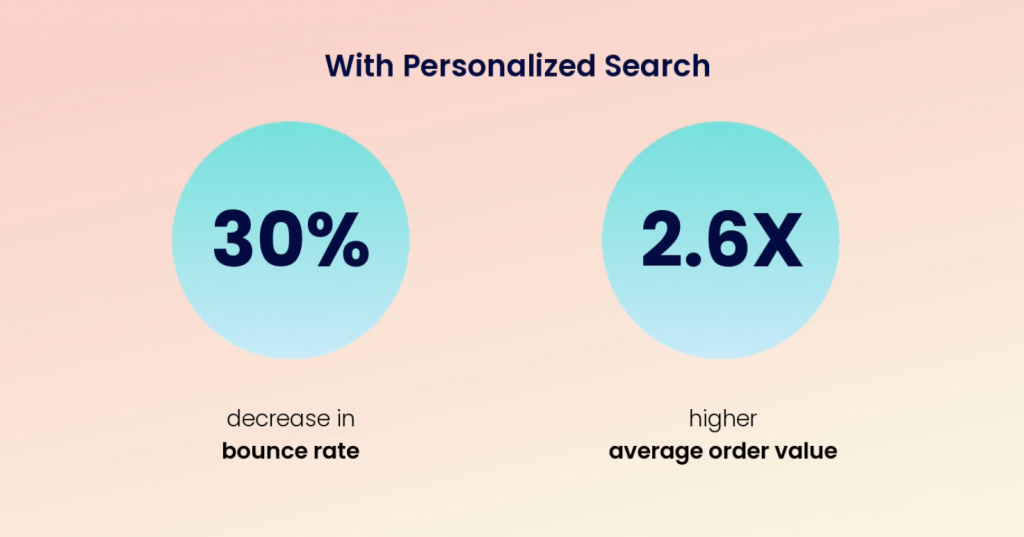
eCommerce site search software: Best practices and key features
When it comes to eCommerce site search, the first and most important thing to do is to make the search box highly visible. Giant retailers like Amazon, Walmart, and Alibaba all do this by placing the search bar at the top of the homepage or even in the middle of the hero section.
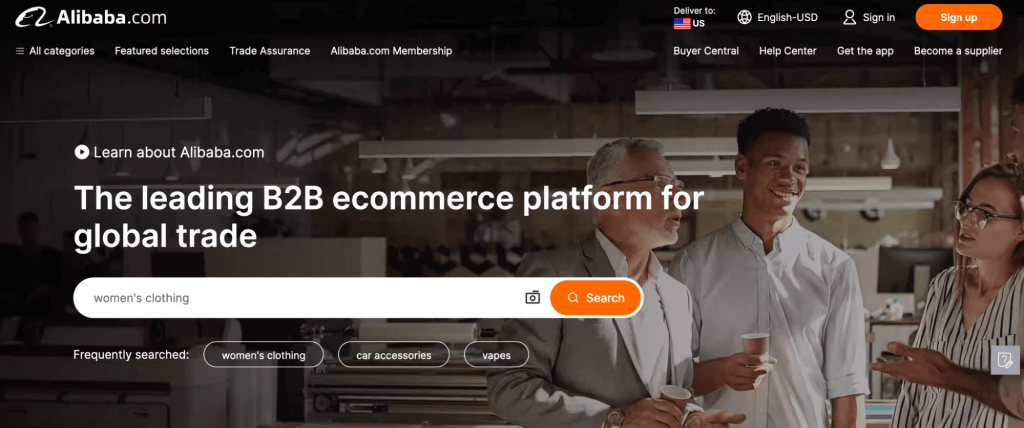
Beyond this obvious (but still overlooked best practice) there are a few other site search functionalities to consider. Below, we’ll explore four essential features to look for and the best practices they enable.
Relevant search results for every query type
At a fundamental level, a site search solution has to return accurate results to every user. This is easy when searchers use very specific language that describes the product and its attributes in detail.
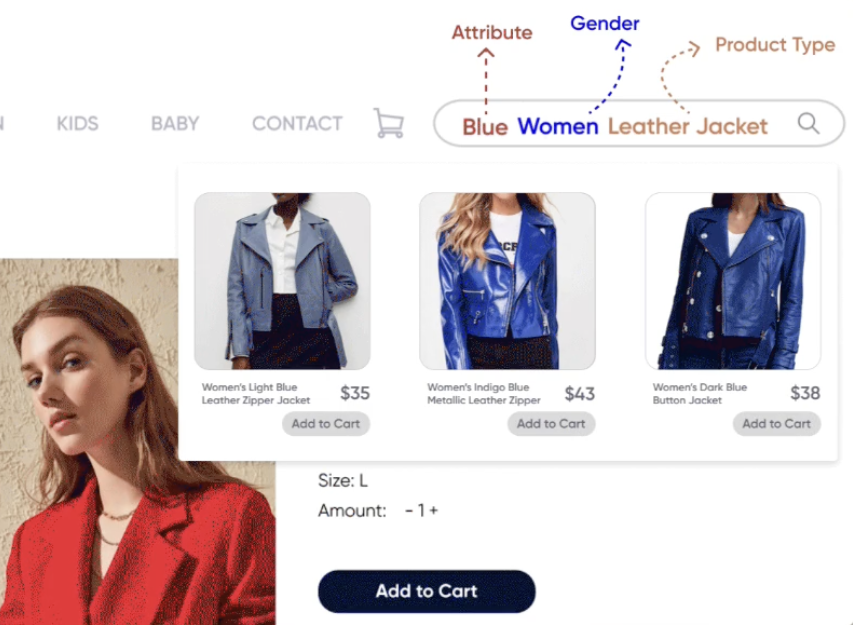
However, these are a small number of all searches. According to the Baymard Institute, there are eight key search query types:
- Exact, when users know the specific product they’re looking for and enter its model, number, or another identifier.
- Product type, when users search for a whole category of products.
- Symptom, when users describe a challenge they’re facing in the hopes of finding a product that can help.
- Non-product searches, when users search for things like shipping or return policies.
- Feature, when users search for one or more product attributes (e.g., price, size, or color).
- Thematic, where the exact boundaries of the query can’t be defined easily (e.g., “winter shoes”, “office furniture”, or “birthday gifts”).
- Compatibility, where users search for the name of a brand or product they own along with an accessory or spare part they’re looking for.
- Slang, abbreviation, and symbol, where users type in a linguistic shortcut.
Using a solution that supports as many of these search query types as possible is essential for delivering a great customer experience. According to Baymard, over 42% of all websites perform below the acceptable eCommerce UX performance level across these eight types, so supporting just a few of them can set you apart from the competition.
Sorting filters
Sorting is another common behavior that users perform when searching for products, especially when their queries aren’t very specific and they need to organize the results in a way that suits their needs.
For example, price-conscious customers may sort from cheapest to most expensive, while customers looking for the best-possible option may sort based on ratings and reviews.
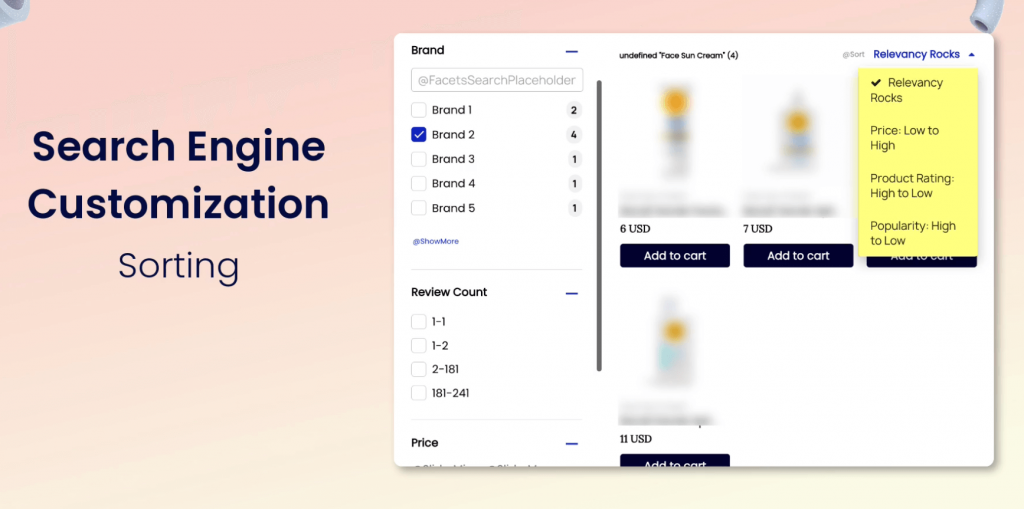
Put simply, the more sorting options you can provide, the higher the chance each searcher can organize the results in a useful way.
Faceted search
The term faceted search refers to the process of using attributes to filter down a large selection of data. In the context of eCommerce, this means letting users narrow down their initial search results using various filters like:
- Price.
- Brand.
- Ratings.
- Category.
- And more.
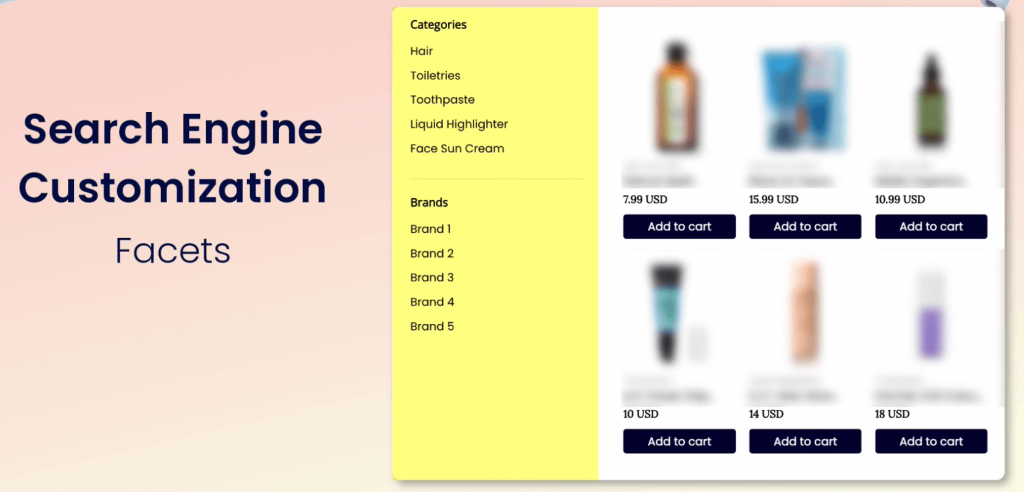
Again, this is something that the top eCommerce brands have done for years, yet many online stores still haven’t implemented it. That’s why it’s a good idea to look for a site search solution that lets you configure different types of faceting filters, based on your product catalog and customer needs.
Synonym and typo tolerance
Like we said, people rarely search for the exact product they need in explicit detail. They often use synonyms and make typos, so your site search solution should still return relevant results in those cases.
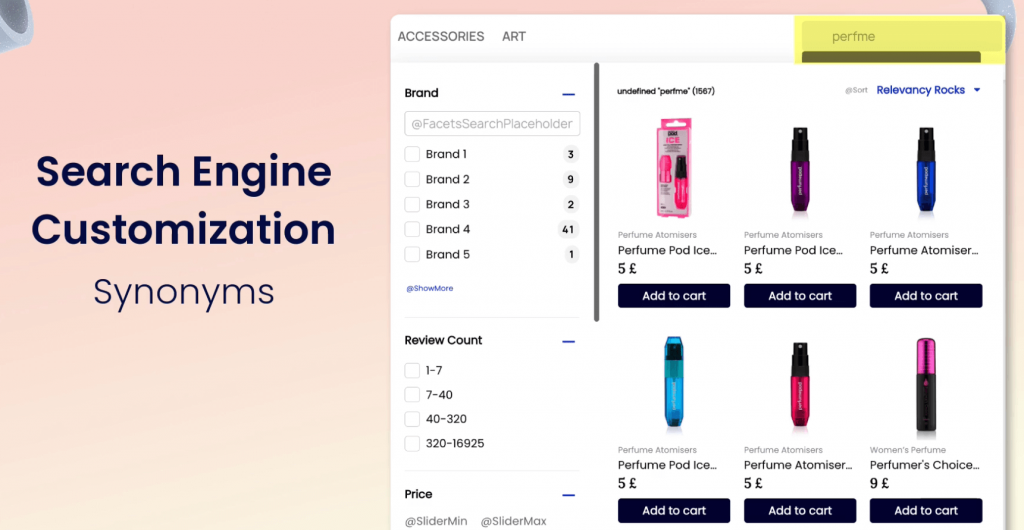
Many site search solutions have this as built-in typo tolerance that works automatically. Some also let you manually add synonyms to a specific keyword, so you can be sure that they yield the same results.
The 3 best eCommerce site search solutions
In this section, we’ll explore three platforms that can help you deliver a personalized site search experience to shoppers.
The first one (Insider) is a complete personalization platform that can tailor all elements of the customer experience, including site search results, product recommendations, emails, push notifications, messaging channel communications, and more. The final two providers (Algolia and Hawksearch) also offer some complementary features but are mainly focused on site search.
#1 Insider
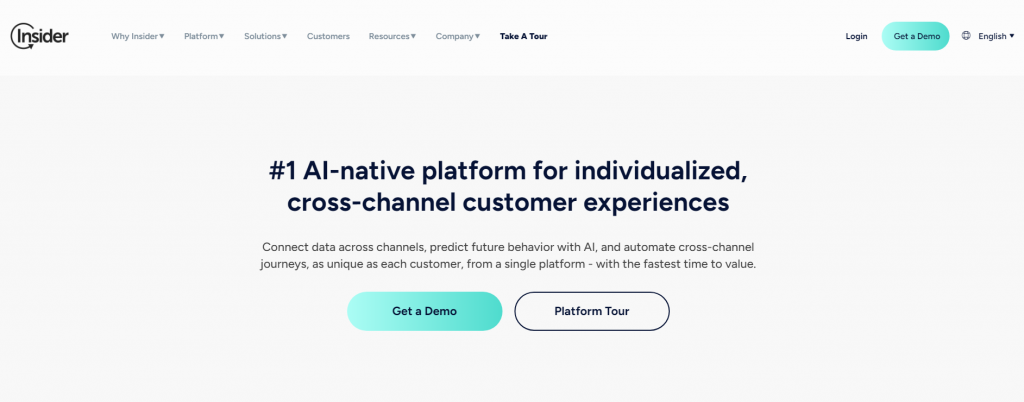
Insider brings together the most extensive set of personalization capabilities for websites and mobile apps, as well as for channels like email, SMS, web push, and WhatsApp.
As an advanced personalization solution, Insider has been ranked as the best personalization engine by customers on G2.
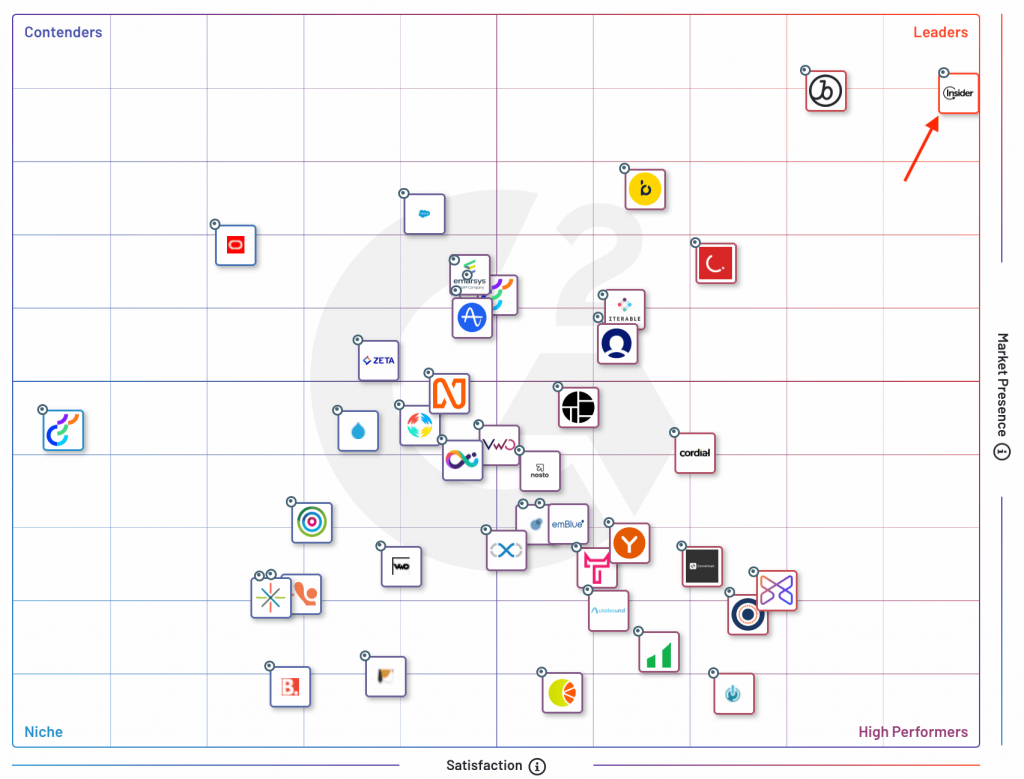
Our platform offers a specialized site search and merchandising solution called Eureka. This AI-powered solution lets you improve product discovery by:
- Recommending the right products to every customer who uses your site or app’s search capability based on their past and predicted behavior.
- Understanding shoppers’ intent and delivering relevant results even in the case of misspellings and synonyms.
- Helping shoppers find exactly what they need with advanced faceting filters and sorting options.
Below, you’ll learn how you can leverage Eureka for your business and use the rest of Insider’s toolkit to deliver personalized customer experiences that improve conversions, revenue, and retention.
Deliver personalized site search results to every shopper
In a nutshell, Eureka works by:
- Analyzing search terms with NLP to understand the words and phrases that shoppers use and extract their intent.
- Querying your product catalog depending on the search term analysis, your filters and sorting options, and your website locale.
- Ranking the results to promote the most relevant products based on the text relevance, users’ website activities, personalization, and merchandising rules.
You can easily integrate Eureka on your site and launch instant search campaigns without coding. This is possible thanks to our pre-built template and no-code visual editor, which lets you easily customize all styling and CTA elements.
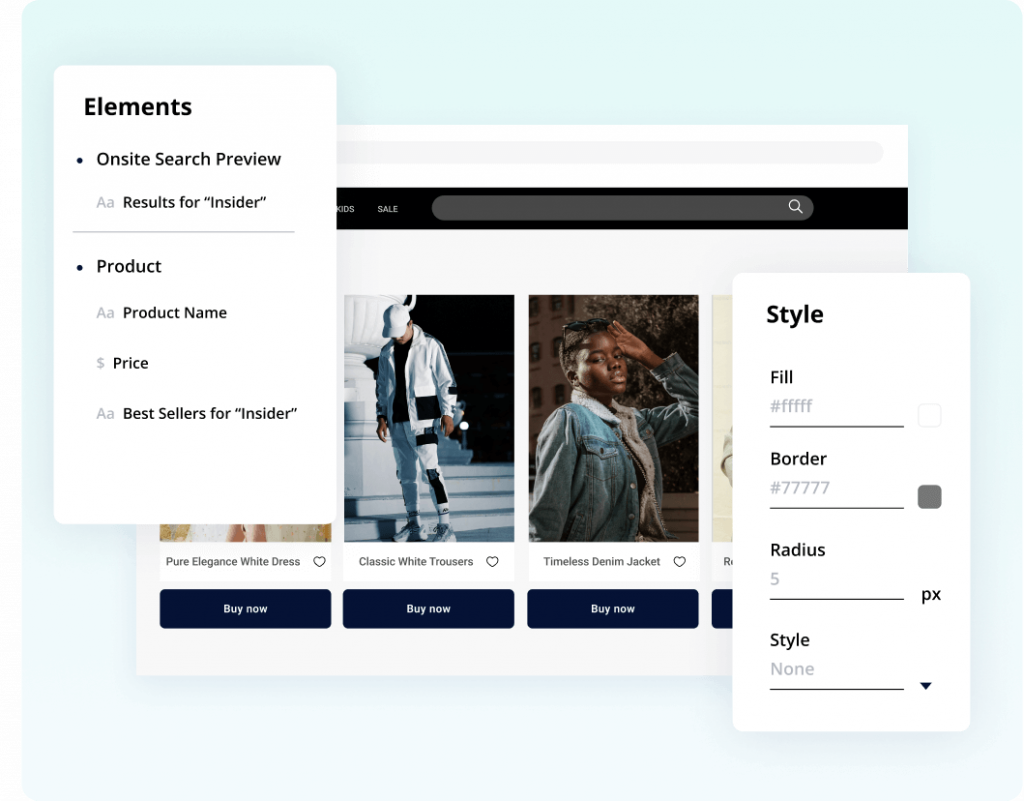
Alternatively, you can connect to our API and customize everything to your needs using HTML, CSS, and JavaScript.
Beyond that, EUREKA also lets you take advantage of:
- Advanced faceting filters: These filters help users refine search results based on defined product attributes such as price, category, brand, and rating. They’re crucial for many shoppers, especially those who don’t know the exact product they’re looking for.
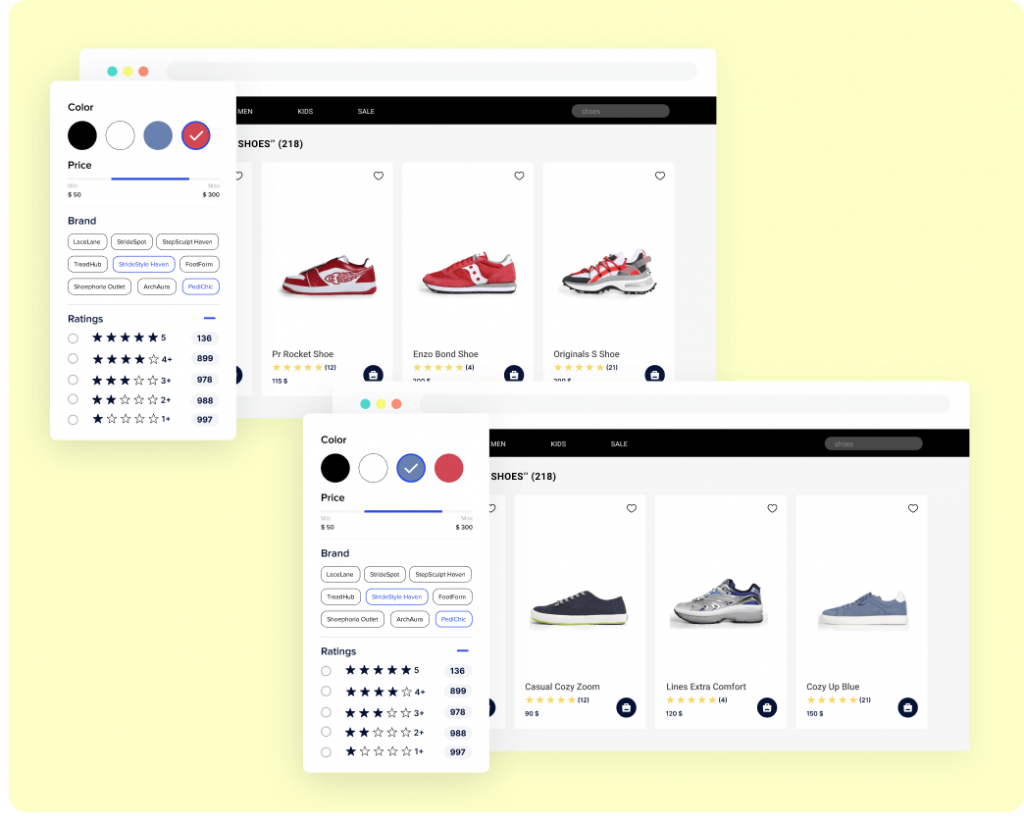
- Synonyms: You can easily add synonyms to specific keywords, depending on the searchers’ intent. For example, a search like “shoes” is very broad, so you can add synonyms like “sneakers”, “trainers”, or “mocassins” to show relevant results and guide shoppers in the right direction.
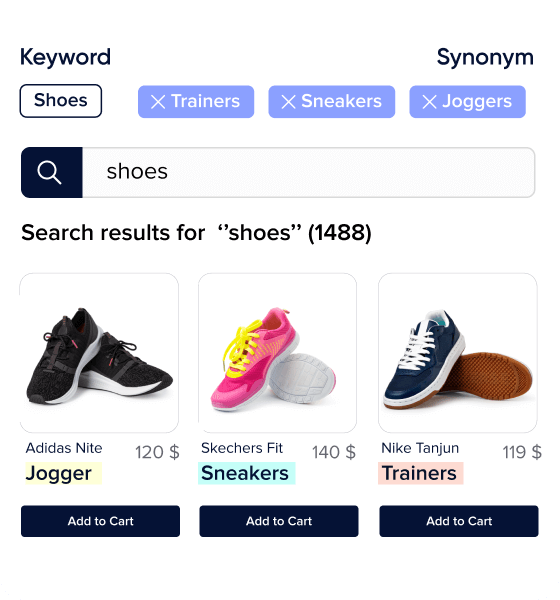
- Typo tolerance: Eureka automatically understands users’ intent, so typos (which are very common) don’t prevent it from serving the most relevant results.
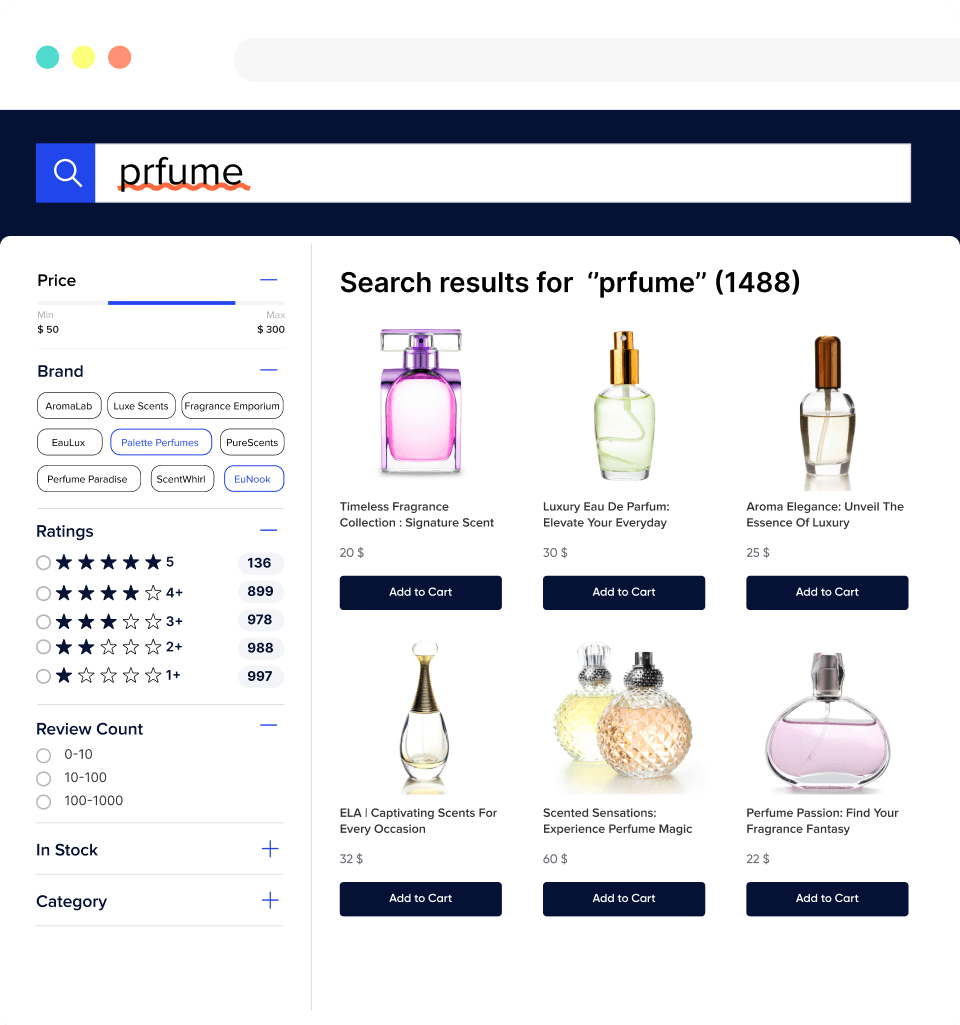
- Search previews: Eureka can quickly start showing previews while shoppers are typing their query (and even auto-complete user queries). This is a great way to engage potential customers and draw them further into a category or product page.
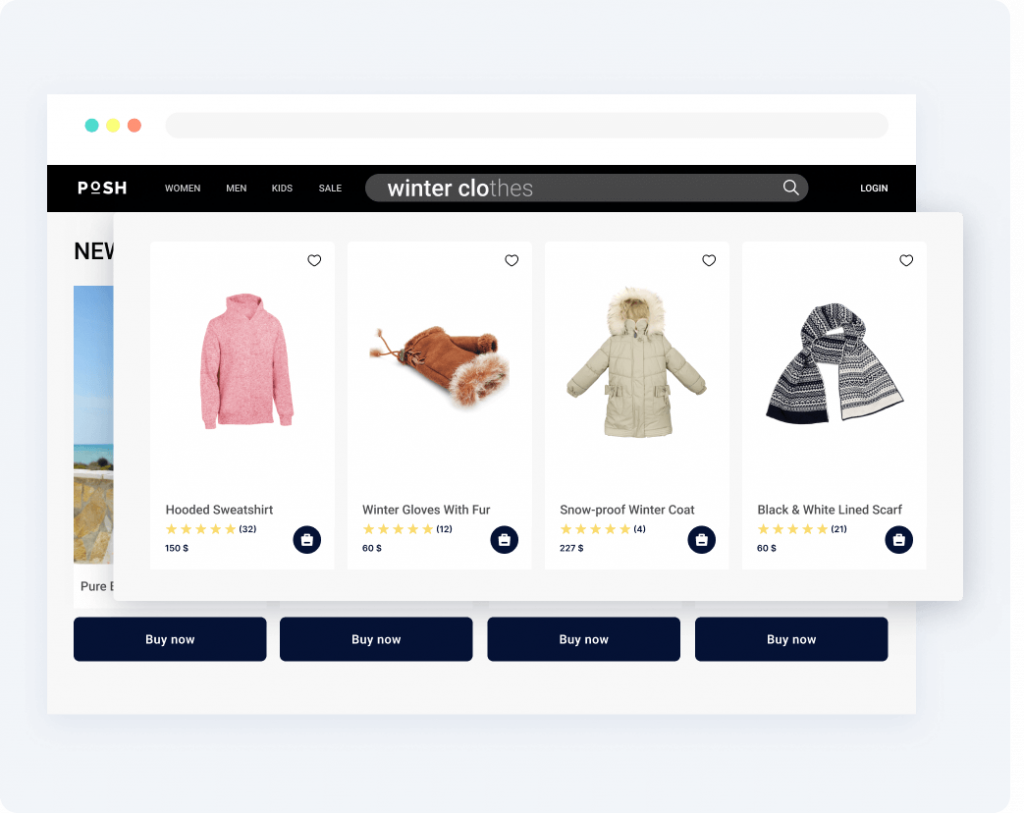
- Search results reorganization: You can manually rearrange the search results for specific keywords in order to boost, bury, hide, or pin products based on certain attributes (e.g., new products, prices, colors, sizes, discounts, and so on).
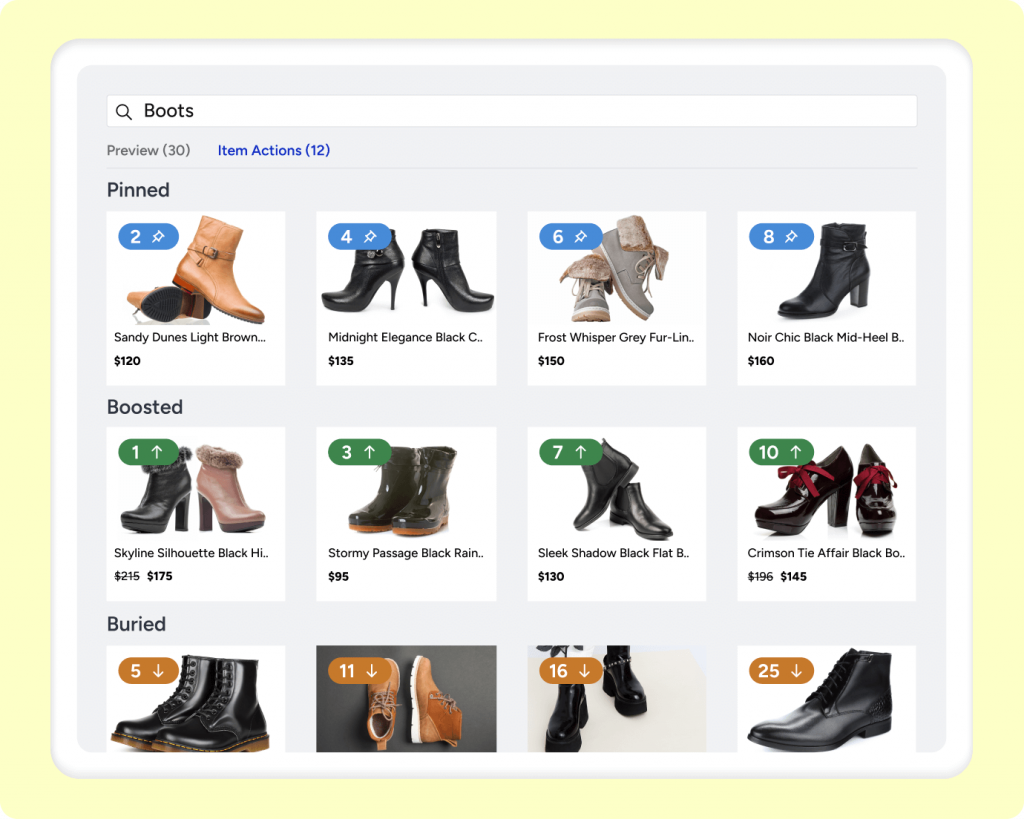
Personalize the entire shopping experience across your site and app
As an advanced website personalization solution, Insider also lets you tailor all other elements of your site (outside of search results). This is essential for optimizing your conversion rates and making the most out of the budget your spend to bring people to your site.
With Insider, you can personalize your site’s:
- Banners and categories. For example, our solution can rearrange how categories are presented to each visitor, based on their browsing and purchase history, preferences, and more. Adidas leveraged this strategy to achieve a 50.3% increase in mobile conversion rates.
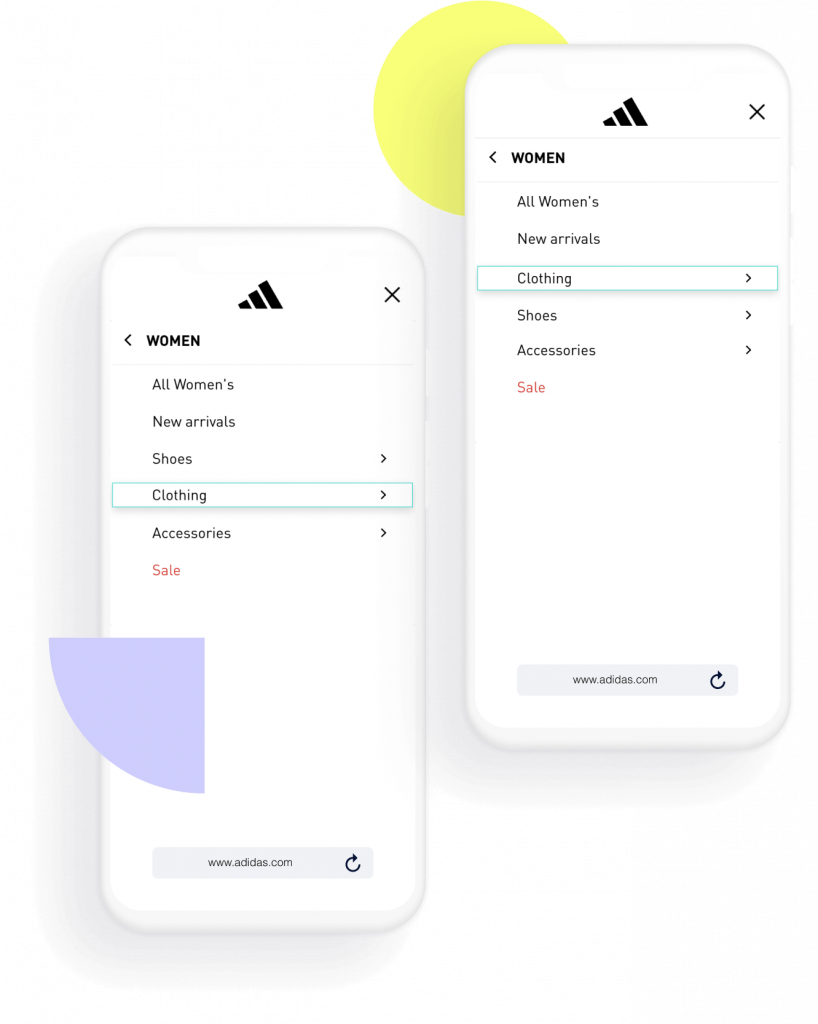
- Product recommendations. Our AI-powered algorithms can deliver personalized recommendations across all or some of your website’s pages. You can choose from a variety of recommendation strategies, like best sellers, most discounted, purchased together, related products, and more. Sapphire used these personalized product suggestions to generate a 12x ROI.
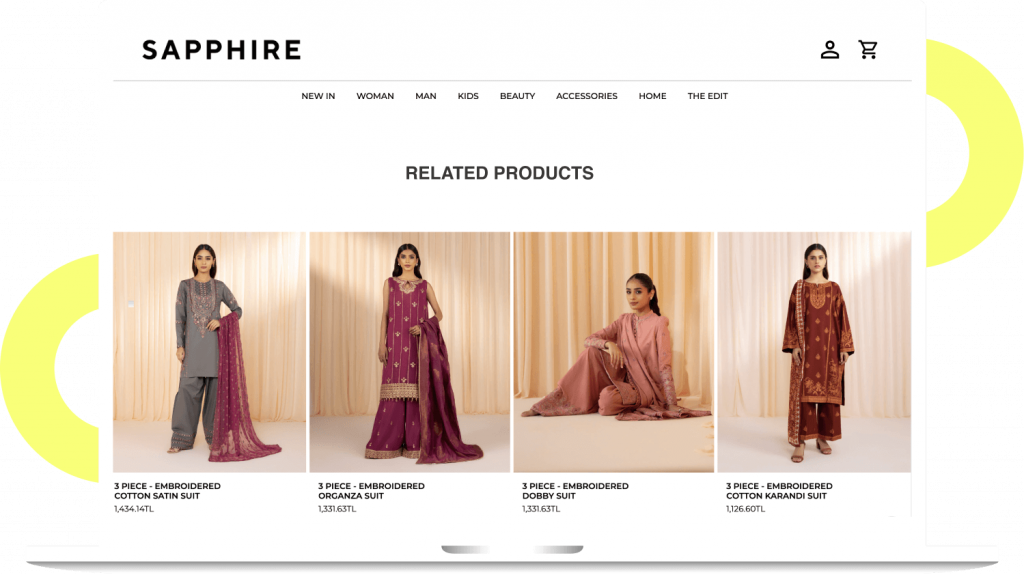
- Mobile stories. Insider’s InStory tool lets you add Instagram-like stories to your mobile site or app that catch users’ attention and drive conversions. These stories can also be personalized for everyone who opens them. Dover Saddlery used InStory to repurpose their Instagram content for their site and drive $1.7 million in incremental revenue.
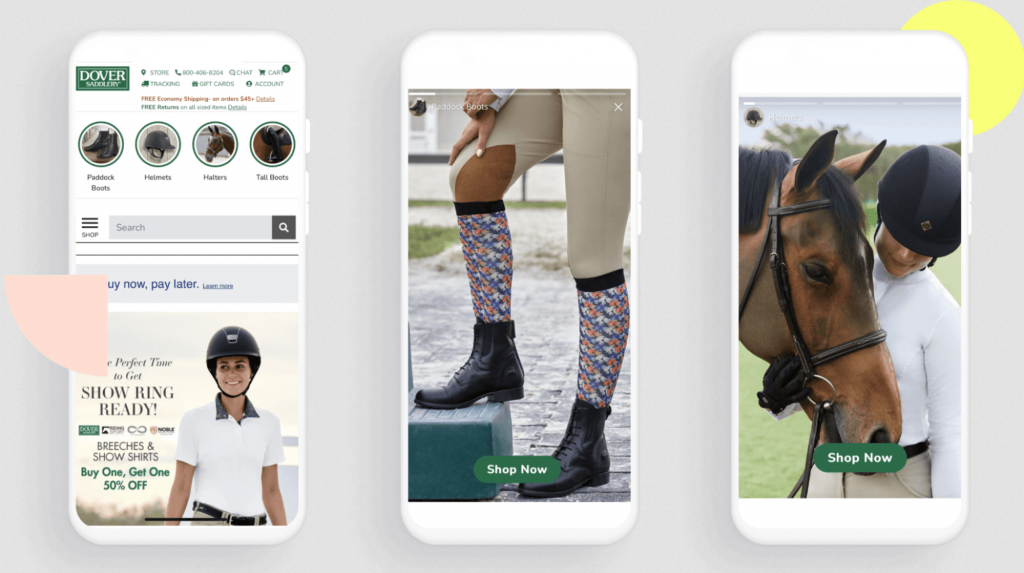
Lastly, Insider offers a ton of proven templates for all sorts of eCommerce website personalization and engagement use cases, like:
- Adding social proof.
- Generating more leads via gamification.
- Showing a purchase progress bar to stimulate more purchase completions.
- And more.
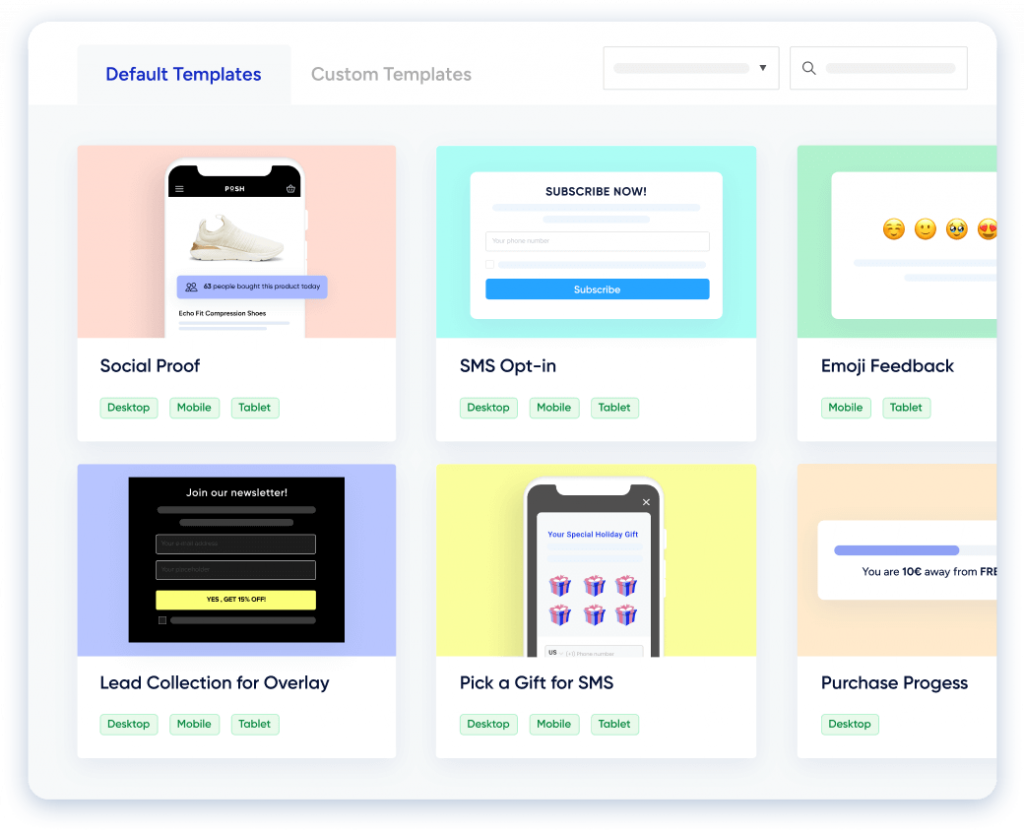
You can easily customize these templates using our no-code editor. This means you can quickly launch, analyze, and optimize website personalization campaigns, without a heavy reliance on technical teams.
Create individualized, cross-channel experiences across all customer touchpoints
Unlike many website personalization platforms, Insider doesn’t just focus on tailoring the customer experience across your site. Instead, our platform brings together 12+ plus channels under one umbrella, including:
- Social media and search engine ads.
- Push notifications.
- Email and SMS.
- WhatsApp.
- And more.
This means you can reach customers across these touchpoints and personalize every interaction you have with them. For example, you can use Insider to:
- Send highly-targeted emails. You can create automated email campaigns for different use cases and even scale your personalized product recommendations across email. You can also use AMP to deliver interactive, web-like experiences right inside your emails. Note: Remix used Insider’s email and marketing automation features to increase first purchases by 104%.
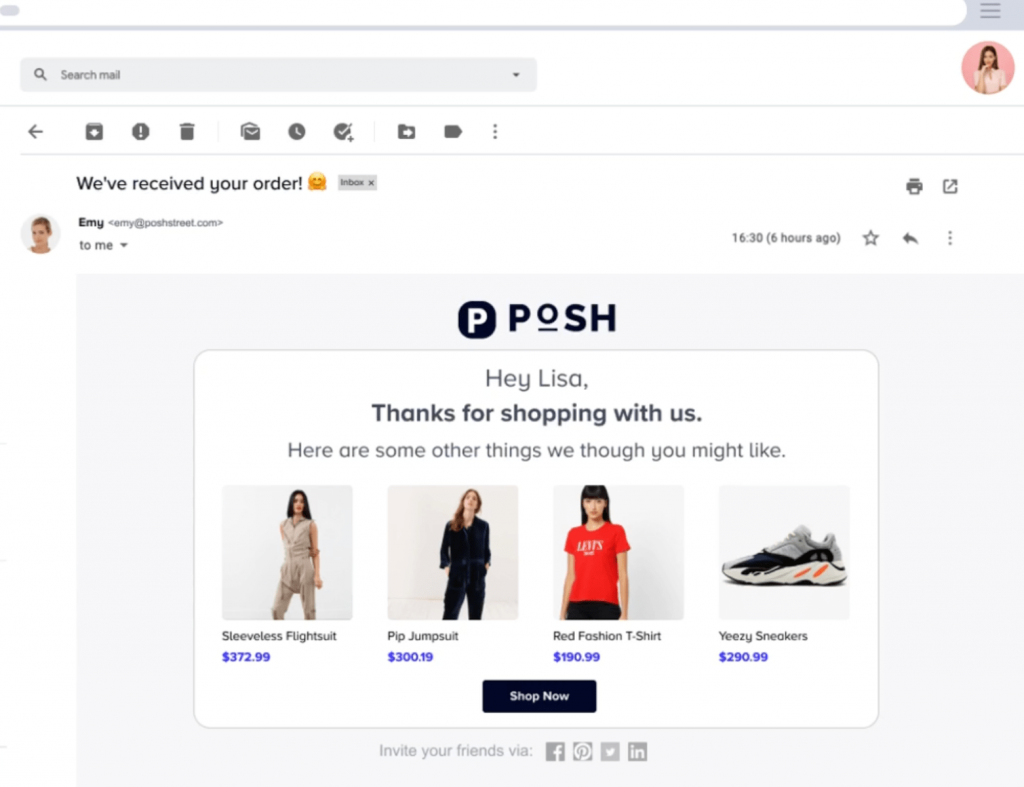
2. Reach users on messaging channels like SMS, WhatsApp, Facebook Messenger, and LINE. These channels are fantastic for a plethora of use cases, like sending personalized promo messages, price drop alerts, event reminders, and more. You can even create end-to-end shopping experiences inside WhatsApp using its conversational commerce feature.
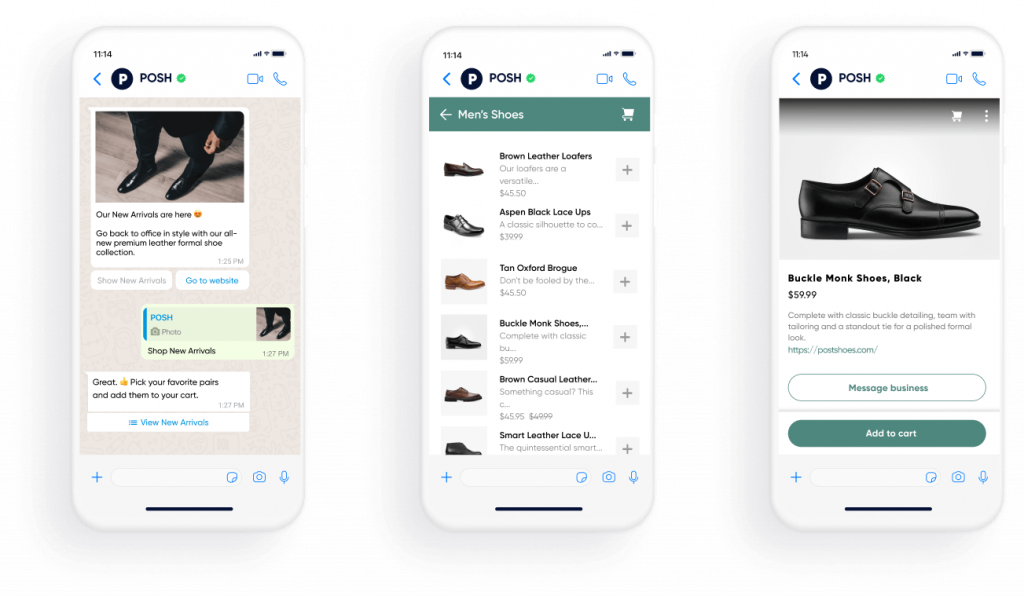
3. Target specific detailed customer segments across Google, Facebook, and TikTok. With Insider, you can build highly targeted customer segments using standard, predefined, and predictive characteristics. You can then export and target those segments across various ad networks. Monster Notebook used this strategy to generate a 2.9x return on ad spend and reduce CPA by 65%.
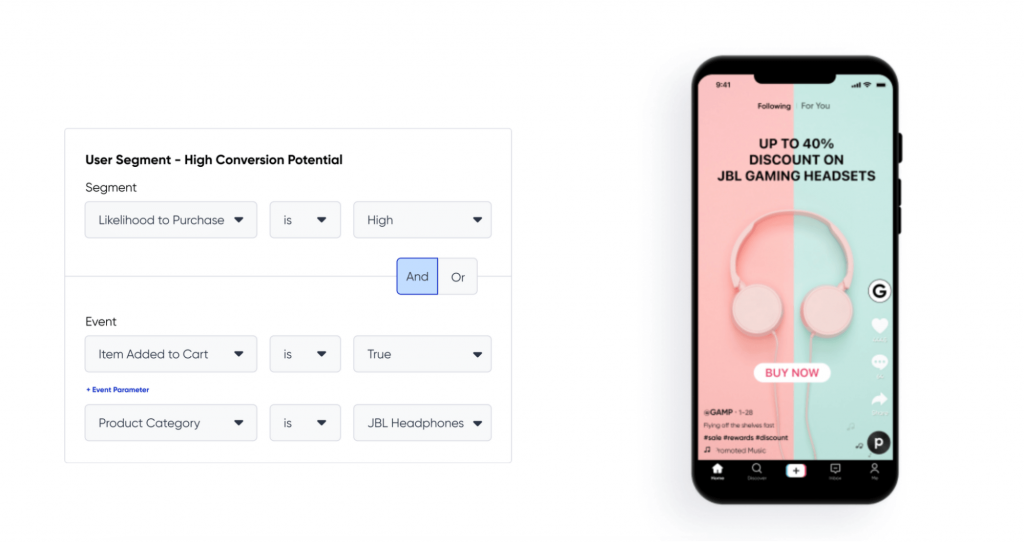
You can bring all of these channels together and ensure you’re delivering a cohesive experience with Architect — our customer journey builder and marketing automation tool. Architect can be used to build simple automated flows and complex omnichannel campaigns for all sorts of use cases like:
- Cross-selling items on messaging channels like SMS or WhatsApp.
- Maximizing AOV and CLTV with lifecycle marketing tactics at different stages of the customer journey.
- Bringing customers back to your site and reducing cart abandonments with personalized web push notifications.
- And much more.
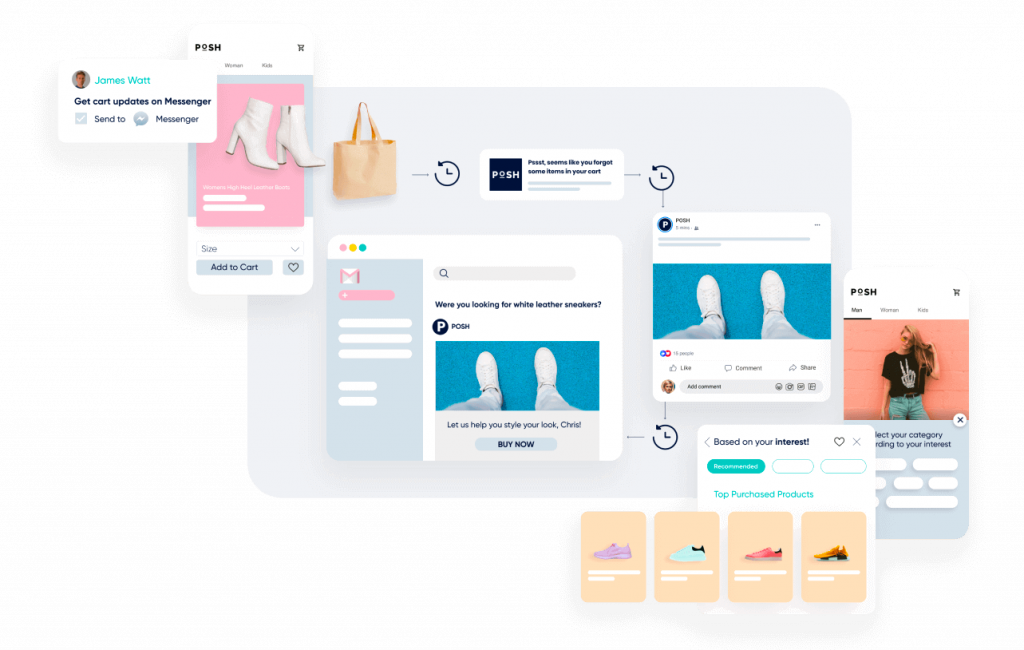
You can control the entire process via a simple drag-and-drop editor. Plus, Architect’s AI-powered capabilities ensure every message is sent on the right channel, at the right times, and to the right audience segments.
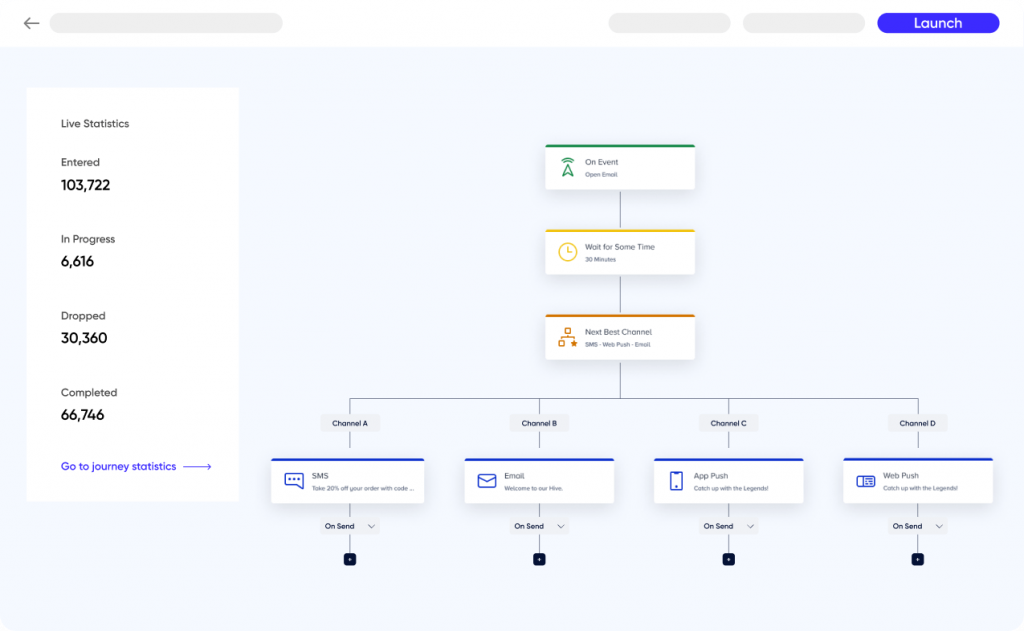
For more details, you can check out:
- Our guide to eCommerce marketing automation, where we explore different automation tools and strategies for eCommerce stores.
- Our case study with fashion brand NA-KD, which used Insider personalization capabilities across their website, mobile app, email, push notifications, and SMS communications for a 25% uplift in CLTV and 72x ROI in 12 months.
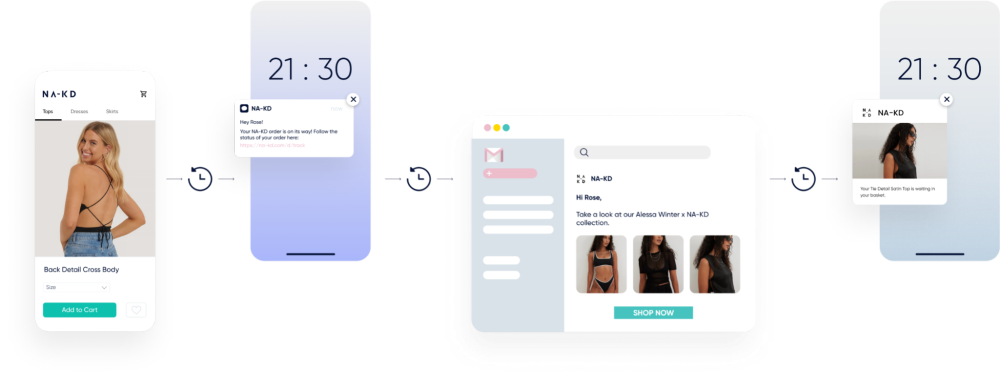
Overall, we’ve seen that Insider’s ability to consolidate so many channels under a single umbrella helps companies:
- Simplify their operations, compared to using a bunch of point solutions with separate credentials, UIs, and learning curves.
- Optimize their spend and total cost of ownership (TCO), compared to paying for different tools and keeping track of subscription periods, pricing plans, and pricing factors.
- Maximize their marketing spend and budget as a direct consequence of the previous two benefits.
#2 Algolia
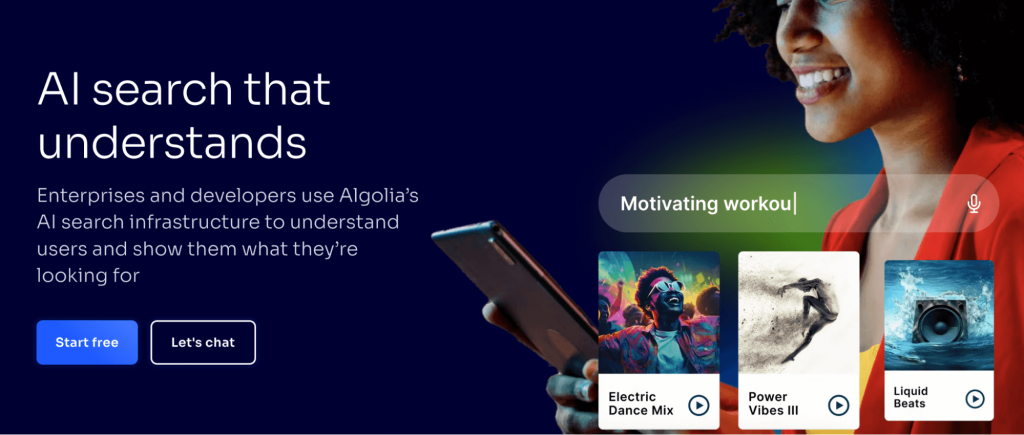
Algolia is an AI search suite for eCommerce, marketplace, media, and Saas businesses. Its AI Search product helps users find what they’re looking for by combining semantic search with keyword search. It also uses other techniques like query categorization, dynamic re-ranking, personalization, and more to deliver the most relevant results. Lastly, Alogilia can be used in different scenarios, like product search, image search, voice search, and more.
#3 Hawkseach
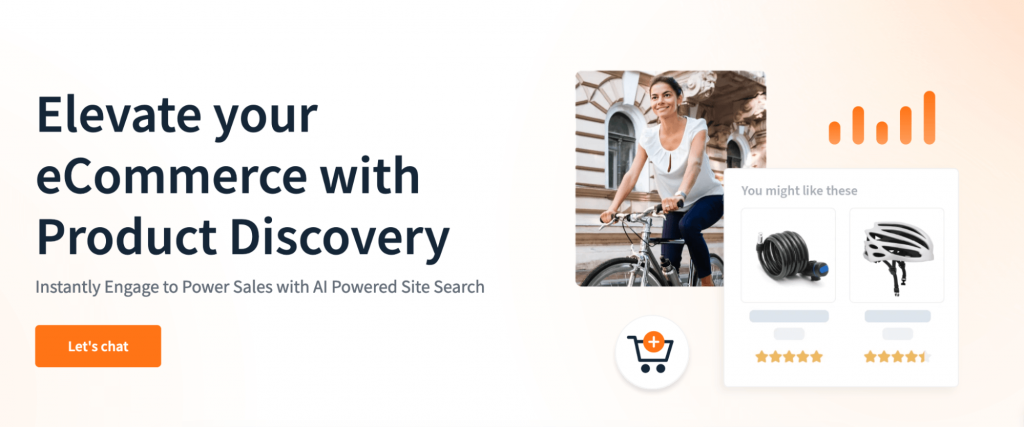
Hawksearch is a product discovery solution for businesses in industries like eCommerce, healthcare, higher education, entertainment, publishing, and more. Their Smart Search tool supports four main use cases:
- Keyword search, which is the common way of searching with keywords and facets.
- Concept search, which refers to the process of asking a question or describing a concept.
- Image search, which lets users upload an image (or take a photo) to find the relevant product.
- Image finder, which lets users describe an image via text.
Deliver completely personalized shopping experiences at scale with Insider
Insider’s Eureka enables your website or mobile app to proactively recommend the most relevant products to each customer based on their browsing history, preferences, and more. Eureka also delivers a smooth search experience with advanced faceting filters, typo and synonym tolerance, and more.
At the same time, Insider offers way more than a site search solution. Using our enterprise marketing platform, you can:
- Create a completely personalized customer experience. Our personalization engine can digest customer data from any relevant data source and automatically deliver relevant content, messaging, and product recommendations.
- Aggregate customer data from any online or offline source. Our eCommerce CDP can unify your customer data — from CRMs, CMSs, eCommerce platforms (like Shopify, BigCommerce, and Magento), analytics tools, and more — into a single convenient database. This enables you to overcome data silos and power your campaigns with reliable insights in real-time.
- Create individualized experiences across email, push notifications, and messaging channels. Insider brings a plethora of channels under one roof, including email, push notifications, SMS, WhatsApp, Facebook Messenger, and more. With our customer journey builder, you can build and automate personalized campaigns across all these touchpoints from one place.
- Take full advantage of AI’s marketing potential. As an AI-native platform, Insider offers a unique combination of generative, predictive, and conversational AI capabilities. With them, you can deliver relevant content and product recommendations to visitors across all channels, engage in two-way conversations, scale A/B tests, work faster and more efficiently, and much more.
Finally, Insider versatile setup options, experienced support team, and massive template library will let you get started and see a meaningful return on your investment as quickly as possible.
Click here to book a demo with our team and learn how Insider can help you reach your business goals.

